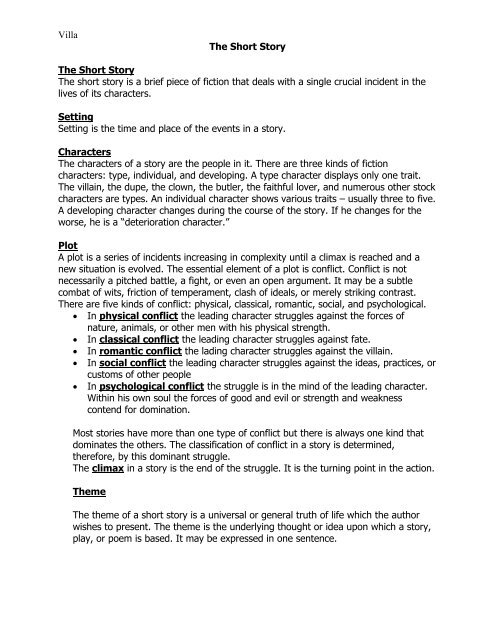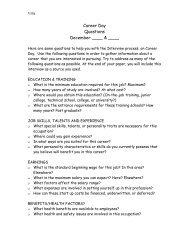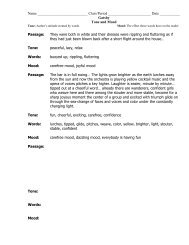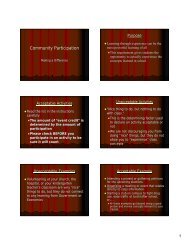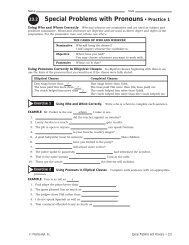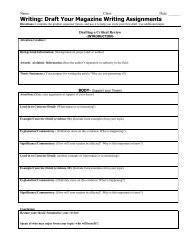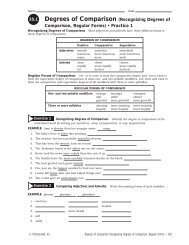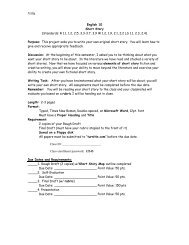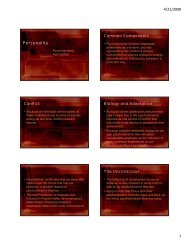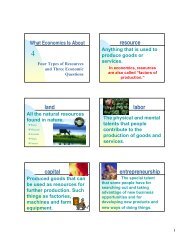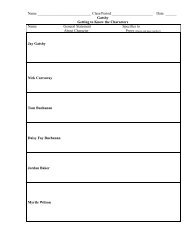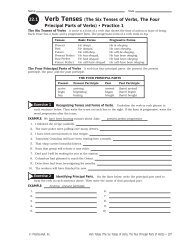Villa the short story
Villa the short story
Villa the short story
Create successful ePaper yourself
Turn your PDF publications into a flip-book with our unique Google optimized e-Paper software.
<strong>Villa</strong>The Short StoryThe Short StoryThe <strong>short</strong> <strong>story</strong> is a brief piece of fiction that deals with a single crucial incident in <strong>the</strong>lives of its characters.SettingSetting is <strong>the</strong> time and place of <strong>the</strong> events in a <strong>story</strong>.CharactersThe characters of a <strong>story</strong> are <strong>the</strong> people in it. There are three kinds of fictioncharacters: type, individual, and developing. A type character displays only one trait.The villain, <strong>the</strong> dupe, <strong>the</strong> clown, <strong>the</strong> butler, <strong>the</strong> faithful lover, and numerous o<strong>the</strong>r stockcharacters are types. An individual character shows various traits – usually three to five.A developing character changes during <strong>the</strong> course of <strong>the</strong> <strong>story</strong>. If he changes for <strong>the</strong>worse, he is a “deterioration character.”PlotA plot is a series of incidents increasing in complexity until a climax is reached and anew situation is evolved. The essential element of a plot is conflict. Conflict is notnecessarily a pitched battle, a fight, or even an open argument. It may be a subtlecombat of wits, friction of temperament, clash of ideals, or merely striking contrast.There are five kinds of conflict: physical, classical, romantic, social, and psychological.• In physical conflict <strong>the</strong> leading character struggles against <strong>the</strong> forces ofnature, animals, or o<strong>the</strong>r men with his physical strength.• In classical conflict <strong>the</strong> leading character struggles against fate.• In romantic conflict <strong>the</strong> lading character struggles against <strong>the</strong> villain.• In social conflict <strong>the</strong> leading character struggles against <strong>the</strong> ideas, practices, orcustoms of o<strong>the</strong>r people• In psychological conflict <strong>the</strong> struggle is in <strong>the</strong> mind of <strong>the</strong> leading character.Within his own soul <strong>the</strong> forces of good and evil or strength and weaknesscontend for domination.Most stories have more than one type of conflict but <strong>the</strong>re is always one kind thatdominates <strong>the</strong> o<strong>the</strong>rs. The classification of conflict in a <strong>story</strong> is determined,<strong>the</strong>refore, by this dominant struggle.The climax in a <strong>story</strong> is <strong>the</strong> end of <strong>the</strong> struggle. It is <strong>the</strong> turning point in <strong>the</strong> action.ThemeThe <strong>the</strong>me of a <strong>short</strong> <strong>story</strong> is a universal or general truth of life which <strong>the</strong> authorwishes to present. The <strong>the</strong>me is <strong>the</strong> underlying thought or idea upon which a <strong>story</strong>,play, or poem is based. It may be expressed in one sentence.
<strong>Villa</strong>Conflicts in LiteratureMost conflicts fall in to one of <strong>the</strong> following categories. Remember, <strong>the</strong>re can be morethan one conflict (and <strong>the</strong>refore more <strong>the</strong>n one climax) in any <strong>story</strong> or novel.Here are some examples to get you brainstorming for your Short Narrative:("Man” is used to refer to “human'”)Man vs. Man(Superman vs. Lex Lu<strong>the</strong>r)Man vs. Himself(Huck Finn vs. his Conscience-- should he turn Jim in or let him remain free?Man vs. Society(Thoreau vs. American government/ society by refusing to pay taxes)Man vs. Nature(Human(s) vs. Any Force of Nature (flood, drought, mountain, ice, rain, etc.)Man vs. Fate/God(Oedipus-Rex vs. His Predetermined Destiny to kill his fa<strong>the</strong>r and marry hismo<strong>the</strong>r)
<strong>Villa</strong>List of Literary DevicesAlliterationAlliteration is <strong>the</strong> repetition of similar sounds, generally at <strong>the</strong> beginning of words and usually by means of consonants or consonantsound clusters in a group of words. (“The willfull waterbeds help me thrall, / <strong>the</strong> laving laurel turned my tide.”)AllusionIn literature, this is a reference to ano<strong>the</strong>r work. (In <strong>the</strong> Police song “Wrapped Around Your Finger”, Sting writes, “trapped between<strong>the</strong> Scylla and Charybdis” in reference to Homer’s Oddyssey.)AnecdoteA very <strong>short</strong> <strong>story</strong> that is told to make a point.AssonanceIs <strong>the</strong> repetition of vowel sounds in non-rhyming words.(Hear <strong>the</strong> mellow wedding bells. — Edgar Allan Poe, "The Bells" or And murmuring of innumerable bees - Alfred Lord Tennyson,The Princess VII.203)Consonanceis <strong>the</strong> repetition, at close intervals, of <strong>the</strong> final consonants of accented syllables or important words especially at <strong>the</strong> ends of words(as in blank and think or strong and string or Lady lounges lazily and Dark deep dread.)FlashbackA scene in a <strong>short</strong> <strong>story</strong>, a novel, a narrative poem, or a play that interrupts <strong>the</strong> action to show an event that happened earlier.ForeshadowingThe use of hints or clues in a narrative to suggest what action is to come. Writers use foreshadowing to create interest and buildsuspense.HyperboleHyperbole is an exaggeration of fact used ei<strong>the</strong>r for serious or comic effect. (“Her eyes opened wide as saucers.”)ImageryImagery refers to <strong>the</strong> way words create or suggest pictures in <strong>the</strong> reader’s mind – what we see, hear, smell, feel, or taste. (“Thepungent fragrance of orange blossoms sweetly drifted through <strong>the</strong> air.” / ‘The stunning blue waters sparkled with brilliant clarity.’)IronyA contrast or an incongruity between what is stated and what is meant or between what is expected to happen and what actuallyhappens. The three kinds of irony are verbal irony, in which a writer or speakers says one thing and means something entirelydifferent, dramatic irony, in which a reader or an audience knows something that a character in <strong>the</strong> <strong>story</strong> or play does not know,and irony of situation, in which <strong>the</strong> writer shows a discrepancy between <strong>the</strong> expected result of some action or situation and itsactual result. (“It was ironic when <strong>the</strong> marriage counselor himself got a divorce.”)MetaphorA metaphor is a comparison that is only suggested or implied, with no clear indication of a relation between <strong>the</strong> two items. (“Herface is a wrinkled leaf.”)MotifA reoccurring feature, such as a name, an image, or a phrase, in a work of literature. A motif generally contributes in some way to<strong>the</strong> <strong>the</strong>me of a <strong>short</strong> <strong>story</strong>, novel, poem, or play.OnomatopoeiaOnomatopoeia is <strong>the</strong> use of a word in which <strong>the</strong> sound imitates or suggests its meaning. (Hiss, clang, snap buzz.)OxymoronA phrase where two or more words are diametrically opposed. (Sweet sorrow, wise fool, honest thief, <strong>short</strong> eternity)ParadoxA statement that reveals a kind of truth, although it seems at first to be self-contradictory and untrue.PersonificationA figure of speech in which something nonhuman is given human qualities.(“Grey mist on <strong>the</strong> sea’s face”)SatireA kind of writing that holds up to ridicule or contempt <strong>the</strong> weaknesses and wrongdoings of individuals, groups, institutions, orhumanity in general. The aim of satirists is to set a moral standard for society, and <strong>the</strong>y attempt to persuade <strong>the</strong> reader to set <strong>the</strong>irpoint of view through <strong>the</strong> force of laughter.SimileA figure of speech comparing two essentially unlike things through <strong>the</strong> use of words “like” or “as”. (My love is like a rose)SymbolAny object, person, place, or action that has a meaning in itself and that also stands for something larger than itself, such as a quality, an attitude,a belief, or a value. Such as a rose if often a symbol of love.
IJa:srapeJPqC loulnlvlo.JarsjapErstl9 loJEnltl65+;-+?23
Writer: ___________________________________Evaluator: ________________________________Rubric for Narration: Short StoryFor Peer Review: When we read each o<strong>the</strong>r’s paper, please use <strong>the</strong> words in bold below to locate <strong>the</strong> following in <strong>the</strong>ir <strong>story</strong>. Placebrackets around <strong>the</strong> evidence when you locate it. DO NOT GRADE YOUR OWN STORY! Also, you must provide 3suggestions that will help your writer improve in his/her paper.CriteriaRating ScaleNot veryVeryHow effective is <strong>the</strong> title?1 2 3 4 5How effective is <strong>the</strong> beginning of <strong>the</strong> <strong>story</strong>?12345How well does <strong>the</strong> beginning grab <strong>the</strong>reader’s attention?12345How interesting is <strong>the</strong> main character?12345How effectively does <strong>the</strong> <strong>story</strong> show achange or growth in <strong>the</strong> main character?12345How clearly and vividly is <strong>the</strong> settingdepicted?12345How well is <strong>the</strong> conflict of <strong>the</strong> <strong>story</strong>explained?12345How well does <strong>the</strong> plot build to a climax?12345How well is <strong>the</strong> <strong>the</strong>me developed?12345How effectively have descriptions beenbrought to life with rich sensory details?12345How effective is <strong>the</strong> ending or resolution of<strong>the</strong> <strong>story</strong>?12345How effectively are correct grammar,spelling, and punctuation used?12345How accurate is <strong>the</strong> use of Standard English?12345How effective is <strong>the</strong> dialogue?12345Comments:


